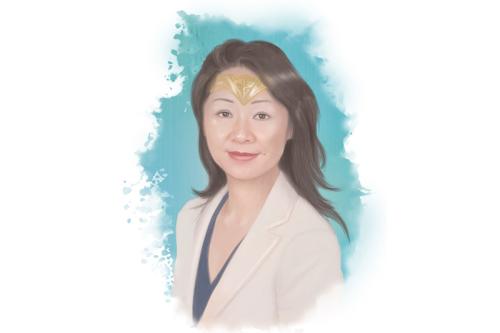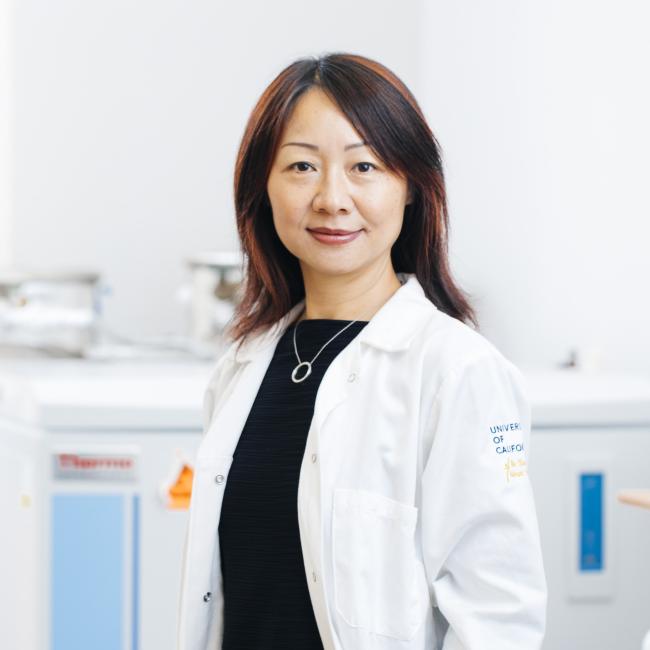
From U Magazine: Wonder Woman
Lili Yang seeks to understand the cellular and molecular mechanisms by which the immune system responds to attack by disease. Through her research, she hopes to develop effective therapies that will engineer the immune systems of patients suffering from cancer and other diseases by manipulating their own blood cells to fight their illnesses.
When did you first start to think about science?
I was in middle school. We learned about physics, chemistry, but what interested me most was biology. The teacher gave us a microscope and told us to pick something to look at under the microscope. I picked a leaf, and when I looked at it under the microscope, it was stunning. When you are a child and you look at a leaf, you think, ‘Oh, it’s just a leaf,’ but under a microscope you see the beautiful structures that make it a leaf, the machinery that makes it a leaf. Biology is beautiful; it is so much more than what you see from just the surface.
Where does your inspiration come from?
I think from the translational aspects of my research. I hate to see people suffer, and one of the reasons I have focused on cancer is that almost everyone knows someone who has suffered from cancer. As a scientist, the idea that something I have discovered through my research can contribute or lead to better treatment, or maybe even to a cure, is what inspires me.
What has been your greatest challenge?
The greatest challenge is to build a good research team. That is both fun and a challenge. We have to recruit and train good people, and it always is exciting to have new blood coming to join us. But one of the big challenges — this is true of any academic research lab — is that once someone is trained, they leave for someplace else as they move up their career ladder. And then you need to train new people. But it also is exciting for me to work with new people, and I learn a lot from them. Students today have been exposed to so much information, they have such a tremendous breadth of knowledge coming in. It is a learning experience for me, as well, and I love that.
What is your motto?
There is a quote from Jonas Salk that is etched into the floor at the entrance to the Salk Institute in La Jolla: “Hope lies in dreams, in imagination and in the courage of those who dare to make dreams into reality.” That is really touching, and very powerful.
To which superhero do you most relate?
Wonder Woman. She has great skills, and she also is a leader.
What do you consider to be your finest achievement?
I think it is having built a research platform that has enabled us to make significant scientific discoveries and advance along translational paths. A significant reason why we came from Caltech to UCLA is because, in addition to excellent research facilities, here there is a world-class hospital and an opportunity to have clinical collaborations to translate our findings into practice to save people’s lives. There are now clinical trials running based on discoveries we have made in our lab. And some of our biotechnology also has moved forward into development to get it into the market and make it available for patients in the future. Those are the things I am most proud of.
Where are you happiest?
In my work, I am happiest when I can make an impactful scientific contribution. I also am happy watching the members of my team grow to become solid and mature scientists and to then go out on their own to pursue their dreams. In my personal life, I am happiest when I am with my husband and our two daughters, spending time together, traveling together, being in the national parks, seeing nature and life in its original form.
What are the qualities of a great scientist?
Curiosity is number one. And being persistent in pursuit of answers. It can be very frustrating to find that your hypothesis is totally wrong, but you need to have the perseverance to carry your work forward, and also the openness to explore new directions to find answers.
Who is your science hero?
My PhD mentor at Caltech, Dr. David Baltimore. He has made so many important discoveries, and he always seems to be ahead of the curve in his research, riding one new wave after another. Besides being a great scientist, he is a great man and a great mentor who has trained generations of new scientists.
What is your greatest virtue?
Perseverance. I find a direction I want to go, and I am pretty good at following it through. And I also am good at working with people.
What is your greatest fault?
Sometimes I have too many things on my plate, and then I need to say I can’t do it all. It is something I have to remind myself about, but I am getting better at knowing there are limits to what I can do.
What do you most value in your colleagues?
I value their critical and a constructive feedback. It can be positive. It can be negative. But I always appreciate their honesty, and also their generosity for sharing their ideas and their support. The willingness to give constructive feedback and to be generous, those are the things I treasure most in my colleagues.
When don’t you think about science?
When I play with my kids. Well, that is not always true. Sometimes they ask me scientific questions. They are 6 and 9 years old, and they both are getting some science-related projects in school, things like how does a bubble become a bubble? Or, how do the sun and the moon move in the sky? So, sometimes they ask me scientific questions. I can’t totally get away from it.
If you were not a scientist, what would you be?
Something entrepreneurial, like running a biotech start-up, taking scientific discoveries made by research scientists like me in the lab and turning them into products to help people.
What is your most treasured possession?
These are not really possessions, but the projects I have done, the discoveries I have made, the students I have trained and the family that I have built.
What keeps you up at night?
Thinking about new questions to explore and how to organize the resources to pursue them.
How do you want to change the world?
By exploring biology more deeply to understand the rules that govern biological systems and using that knowledge to develop therapies to treat disease.
What is your definition of happiness?
Having goals and achieving them. Making significant discoveries, helping my students to grow, raising my children — those things are my definitions of happiness.
What is your definition of misery?
Failing at any one of those things.
